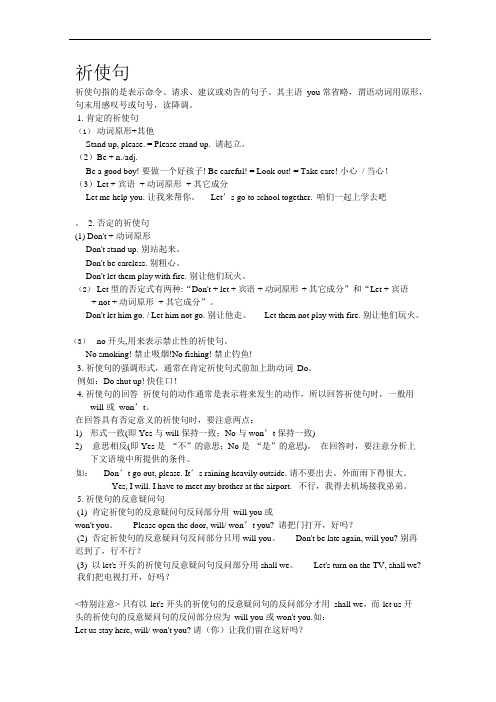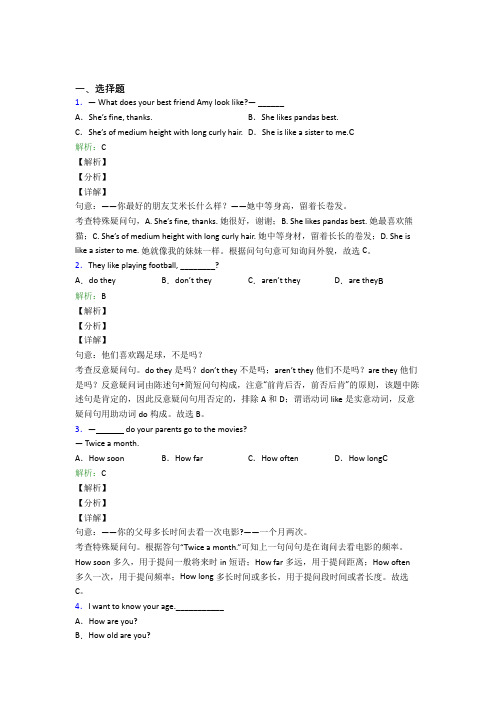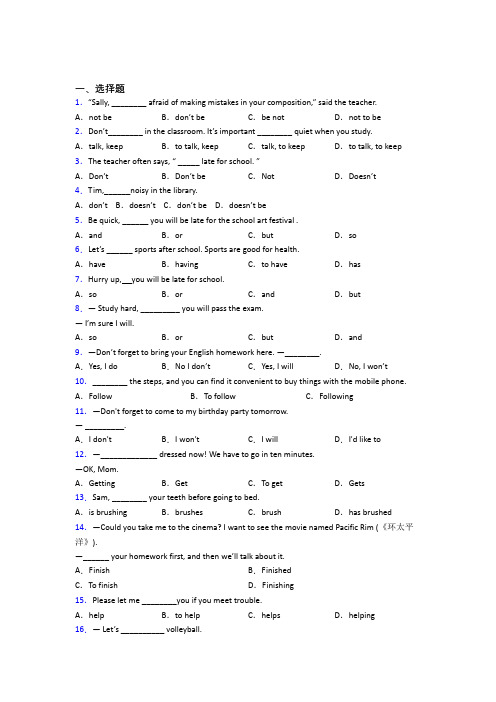祈使句语法及练习题
祈使句语法及练习题word版本

祈使句祈使句指的是表示命令、请求、建议或劝告的句子。
其主语you常省略,谓语动词用原形,句末用感叹号或句号,读降调。
1. 肯定的祈使句(1)动词原形+其他Stand up, please. = Please stand up. 请起立。
(2)Be + n./adj.Be a good boy! 要做一个好孩子! Be careful! = Look out! = Take care! 小心 / 当心!(3)Let + 宾语 + 动词原形 + 其它成分Let me help you. 让我来帮你。
Let’s go to school together. 咱们一起上学去吧。
2. 否定的祈使句(1) Don't + 动词原形Don't stand up. 别站起来。
Don't be careless. 别粗心。
Don't let them play with fire. 别让他们玩火。
(2)Let型的否定式有两种:“Don't + let + 宾语 + 动词原形 + 其它成分”和“Let + 宾语 + not + 动词原形 + 其它成分”。
Don't let him go. / Let him not go. 别让他走。
Let them not play with fire. 别让他们玩火。
(3)no开头,用来表示禁止性的祈使句。
No smoking! 禁止吸烟!No fishing! 禁止钓鱼!3. 祈使句的强调形式,通常在肯定祈使句式前加上助动词Do。
例如:Do shut up! 快住口!4. 祈使句的回答祈使句的动作通常是表示将来发生的动作,所以回答祈使句时,一般用 will或won’t。
在回答具有否定意义的祈使句时,要注意两点:1)形式一致(即Yes与will保持一致;No与won’t保持一致)2)意思相反(即Yes是“不”的意思;No是“是”的意思)。
(完整版)祈使句语法及练习题(可编辑修改word版)

祈使句祈使句指的是表示命令、请求、建议或劝告的句子。
其主语you 常省略,谓语动词用原形,句末用感叹号或句号,读降调。
1. 肯定的祈使句(1)动词原形+其他Stand up, please. = Please stand up. 请起立。
(2)Be + n./adj.Be a good boy! 要做一个好孩子! Be careful! = Look out! = Take care! 小心/ 当心!(3)Let + 宾语+ 动词原形+ 其它成分Let me help you. 让我来帮你。
Let’s go to school together. 咱们一起上学去吧。
2. 否定的祈使句(1) Don't + 动词原形Don't stand up. 别站起来。
Don't be careless. 别粗心。
Don't let them play with fire. 别让他们玩火。
(2)Let 型的否定式有两种:“Don't + let + 宾语+ 动词原形+ 其它成分”和“Let + 宾语+ not + 动词原形+ 其它成分”。
Don't let him go. / Let him not go. 别让他走。
Let them not play with fire. 别让他们玩火。
(3)no 开头,用来表示禁止性的祈使句。
No smoking! 禁止吸烟!No fishing! 禁止钓鱼!3.祈使句的强调形式,通常在肯定祈使句式前加上助动词Do。
例如:Do shut up! 快住口!4.祈使句的回答祈使句的动作通常是表示将来发生的动作,所以回答祈使句时,一般用will 或won’t。
在回答具有否定意义的祈使句时,要注意两点:1)形式一致(即Yes 与will 保持一致;No 与won’t 保持一致)2)意思相反(即Yes 是“不”的意思;No 是“是”的意思)。
初中英语语法知识—祈使句的技巧及练习题附解析

一、选择题1.Hey, James,__________on the wall.A.doesn't draw B.didn't draw C.don't draw D.drew 2.Don’t _____your children_____other children .A.comparing; to B.compare;withC.compare;to D.comparing;with3.Please ________ to take your homework to school.A.don’t forget B.not forget C.not to forget D.forget not to 4.Don’t ________ your glass too _______.A.fill; full B.fill; filled C.full; full D.full; filled5.______ talk in the library.A.Don’t B.Not C.Not to6.Jerry,______ angry with others. It's bad for your health.A.doesn't be B.don't be C.isn't D.don't7._______ afraid of making mistakes. We can learn from our mistakes.A.Be not B.Don’t be C.Not be D.Not to be 8.Let’s ______ sports after school. Sports are good for health.A.have B.having C.to have D.has9.Hurry up, you will be late for school.A.so B.or C.and D.but10.— Study hard, _________ you will pass the exam.—I’m sure I will.A.so B.or C.but D.and11.Let’s _____TV.That _____boring. Can we go out to play games?A.watching,sounds B.watch,sound C.watching,sound D.watch,sounds 12.________ for the English test or you will miss the listening part.A.Don’t late B.Don’t be late C.Don’t arrive lately 13.-Let's make fruit salad.- _____________ .A.No,I'm not B.Thank you C.That's all right D.That's a good idea 14.Please______the rubbish into different litter bins according to the signs.A.puts B.put C.putting D.to put 15.“Sally, ________ afraid of making mistakes in your composition,” said the teacher. A.not be B.don’t be C.be not D.not to be 16.Work hard, ________ you’ll have a big success.A.and B.but C.or D.for 17.—Let’s______ to the songs at the Beach Music Festival this Friday night.—Good idea! I like music.A.listening B.listen C.listens D.to listen18._____ hard and you’ll succeed sooner or later.A.Study B.To studyC.Studying D.Studied19.__________ shouting, please! It's against the rules.A.Don't B.Not C.No20.—Nick, __________ the door when you leave the classroom.—All right. I will.A.to close B.closing C.closed D.close 21.Tom, please. I am afraid it will take you one more hour your homework.A.be quick; finish B.is quick; finishing C.be quick; to finish D.be quickly; to finish 22.—Don’t forget to call me when you arrive there.—________.A.No, I won’t B.Yes, I have C.You’re welcome D.No, thanks 23.Practice more, _______ you’ll learn English better.A.or B.so C.and D.but24._____away from the river,young kids.It’s too dangerous.A.Stays B.Staying C.To stay D.Stay25.—Don’t forget to bring your English homework here. —________.A.Yes, I do B.No I don’t C.Yes, I will D.No, I won’t【参考答案】***试卷处理标记,请不要删除一、选择题1.C解析:C【解析】【详解】句意:嘿,James,,不要在墙上画。
初中英语常用语法知识——祈使句基础练习(答案解析)

一、选择题1.— What does your best friend Amy look like?— ______A.She’s fine, thanks.B.She likes pandas best.C.She’s of medium height with long curly hair.D.She is like a sister to me.C解析:C【解析】【分析】【详解】句意:——你最好的朋友艾米长什么样?——她中等身高,留着长卷发。
考查特殊疑问句,A. She’s fine, thanks. 她很好,谢谢;B. She likes pandas best. 她最喜欢熊猫;C. She’s of medium height with long curly hair. 她中等身材,留着长长的卷发;D. She is like a sister to me. 她就像我的妹妹一样。
根据问句句意可知询问外貌,故选C。
2.They like playing football, ________?A.do they B.don’t they C.aren’t the y D.are they B解析:B【解析】【分析】【详解】句意:他们喜欢踢足球,不是吗?考查反意疑问句。
do they是吗?don’t they不是吗;aren’t they他们不是吗?are they他们是吗?反意疑问词由陈述句+简短问句构成,注意“前肯后否,前否后肯”的原则,该题中陈述句是肯定的,因此反意疑问句用否定的,排除A和D;谓语动词like是实意动词,反意疑问句用助动词do构成。
故选B。
3.— do your parents go to the movies?— Twice a month.A.How soon B.How far C.How often D.How long C解析:C【解析】【分析】【详解】句意:——你的父母多长时间去看一次电影?——一个月两次。
最新初中英语语法知识—祈使句的技巧及练习题附答案

一、选择题1.“Sally, ________ afraid of making mistakes in your composition,” said the teacher.A.not be B.don’t be C.be not D.not to be 2.Don’t________ in the classroom. It’s important ________ quiet when you study. A.talk, keep B.to talk, keep C.talk, to keep D.to talk, to keep 3.The teacher often says, “ _____ late for school. ”A.Don’t B.Don’t be C.Not D.Doesn’t 4.Tim,______noisy in the library.A.don’t B.doesn’t C.don’t be D.doesn’t be5.Be quick, ______ you will be late for the school art festival .A.and B.or C.but D.so6.Let’s ______ sports after school. Sports are good for health.A.have B.having C.to have D.has7.Hurry up, you will be late for school.A.so B.or C.and D.but8.— Study hard, _________ you will pass the exam.—I’m sure I will.A.so B.or C.but D.and 9.—Don’t forget to bring your English homework here. —________.A.Yes, I do B.No I don’t C.Yes, I will D.No, I won’t 10.________ the steps, and you can find it convenient to buy things with the mobile phone. A.Follow B.To follow C.Following11.—Don't forget to come to my birthday party tomorrow.— _________.A.I don't B.I won't C.I will D.I'd like to 12.—_____________ dressed now! We have to go in ten minutes.—OK, Mom.A.Getting B.Get C.To get D.Gets 13.Sam, ________ your teeth before going to bed.A.is brushing B.brushes C.brush D.has brushed 14.—Could you take me to the cinema? I want to see the movie named Pacific Rim (《环太平洋》).—______ your homework first, and then we’ll talk about it.A.Finish B.FinishedC.To finish D.Finishing15.Please let me ________you if you meet trouble.A.help B.to help C.helps D.helping 16.—Let’s __________ volleyball.— That __________ good.A.playing;sounds B.play;soundsC.play;sound D.plays;sound17.—Let’s______ to the songs at the Beach Music Festival this Friday night.—Good idea! I like music.A.listening B.listen C.listens D.to listen 18._____ hard and you’ll succeed sooner or later.A.Study B.To studyC.Studying D.Studied19.—Millie,______ late for school again.—Sorry, I ______.A.don’t; a m not B.won’t be; don’t C.don’t be; won’t D.won’t be; won’t 20.—Miss Green, would you please tell me how to improve my English?—_____ a study group, and you’ll get help from others.A.Join B.Joining C.To join D.If you join 21.Let's __________ tennis in the playground.()A.play B.to play C.plays D.to plays22.o music to make you feel happy when you are sad.A.To listen B.Listens C.Listening D.Listen 23.Don't be late for school again, _________?A.do you B.don't you C.won't you D.will you 24.—I am feeling ill. What should I do?— eating junk food and breakfast every day.A.Stop; having B.Stop; have C.To stop; have. D.To stop; to have 25.Hurry up, _________ you will be late for class.A.and B.or C.but D.so【参考答案】***试卷处理标记,请不要删除一、选择题1.B解析:B【解析】【详解】句意:老师说:“萨利,不要害怕在作文中犯错误。
初中英语常用语法知识——祈使句(含答案解析)

一、选择题1.—Is the young woman playing the violin?—________.A.Yes,she is B.No,she doesn'tC.Yes,she does D.No,he isn't A解析:A【解析】句意:-----那个年轻女子在拉小提琴吗?----是的,她在拉小提琴。
以Is开头的一般疑问句,肯定回答,否定回答中要用is或isn’t,首先排除B,C;the young woman要用she替代,故答案为A。
2.— do your parents go to the movies?— Twice a month.A.How soon B.How far C.How often D.How long C解析:C【解析】【分析】【详解】句意:——你的父母多长时间去看一次电影?——一个月两次。
考查特殊疑问句。
根据答句“Twice a month.”可知上一句问句是在询问去看电影的频率。
How soon多久,用于提问一般将来时in短语;How far多远,用于提问距离;How often多久一次,用于提问频率;How long多长时间或多长,用于提问段时间或者长度。
故选C。
3.—Raymond,you feed the birds today, ________?—But I fed it yesterday.A.do you B.will you C.didn’t you D.don’t you B解析:B【解析】【分析】【详解】句意:—雷蒙德,你今天喂鸟,好吗?—但是我昨天喂它了。
考查反意疑问句。
根据句意,本句是一个肯定祈使句的反意疑问句,其附加句用willyou/won't you来表示。
故选B。
4.—This is your dictionary. And _______________the eraser?—It isn't mine. It's Bob's.A.what about B.how C.who D.what A解析:A【解析】【分析】句意:——这是你的词典。
人教版(Go For It)七下语法:Unit4 祈使句用法及练习

Unit4 祈使句(Imperative Sentence)1.定义:用来表示请求、命令、叮嘱、禁止等的句子。
祈使句的谓语动词用原形,句子没有主语,句末使用感叹号或句号。
2.祈使句句式肯定结构否定结构(1)V原+其它. Don’t+V原+其它.(2)Be+其它. Don’t+be+其它.(3)Let+宾语+V原+其它. Don’t let+宾语+V原+其它./Let+宾语+not+V原+其它.(4)/ No+V-ing/名词.eg. Clean the blackboard !Be quiet.Let him go.No photos !No parking !3.祈使句使用时应注意的问题(1)在表达请求或劝告时,有时为了表示委婉的语气,可以在句首或句末加please,但如果please加在句末,应用逗号将它与前面部分隔开。
eg. Sit down, please.Please give me a hand.(2)有时为了明确向谁提出请求或发出命令,可加称呼语,但称呼语要用逗号与句子隔开。
eg. Put the shirt on the bed, Jim.(3)let’s与let us辨析【练习题】1._____ talk in the reading room.A. Don’tB. NotC. NoD. Be2. —John, up now or we’ll be late for the bus. —All right. I’ll be quick.A.getsB. getC.to getD.getting3. Kerk, the car! An old man is waiting to cross the road. Let him go first.A. stopsB. stopC. don’t stopD. doesn ’t stop4. We are at the library. Please ___ quiet .A. doB. beC. canD. are5. —________, Sally! The school bus is coming.—Oh, no! I can’t find my schoolbag.e onB.Work onC.Put offD.Turn off6. Let’s _______ sports.A. to playB. playsC. playingD. play7. Now let’s our new classmates.A. meetB. meetingC. to meetD. to meeting8. You’re late. ____ late again.A. Don’t beB. Don’t areC. Don’tD. Aren’t9. —The traffic is busy in our city. —Yes, _____on the street.A. not playB. no playC. don’t play10. —Let’s ____ volleyball. —That sounds goodA. playB. to playC. playsD. to plays。
零基础语法练习:四种句子—祈使句(附超详细解析)

四种句子:祈使句练习(附超详细解析)一、翻译下列祈使句。
1.Be quiet!2.Don’t be late again.3.Be careful!e in, please!5.Please open your books!6.Let us help you.7.Watch your head!8.Mind your step!9.NO PHOTOS!10.NO SMOKING!二、把下列句子改为祈使句。
1.You can not smoke here.2.You can’t ride your bicycle here.3.You may come and see.4.You sit down,please.5.You can’t put the book here.6.You can’t cross the road.7.You must not sleep in class.8.You can’t be careless.9.You can’t be late again.10.You can’t do it.答案与解析一、翻译下列祈使句。
1.Be quiet! 保持安静!2.Don’t be late again. 不要再迟到了。
3.Be careful! 小心!e in, please! 请进来!5.Please open your books! 请翻开书!6.Let us help you. 让我们来帮你吧。
7.Watch your head! 注意碰头!8.Mind your step! 当心脚下!9.NO PHOTOS! 禁止拍照!10.NO SMOKING! 禁止吸烟!二、把下列句子改为祈使句。
1. You can not smoke here.答案:Don’t smoke here.解析:否定句改为祈使句,将主语去掉,句首加上Don’t。
2.You can’t ride your bicycle here.答案:Don’t ride your bicycle here.解析:否定句改为祈使句,将主语去掉,句首加上Don’t。
- 1、下载文档前请自行甄别文档内容的完整性,平台不提供额外的编辑、内容补充、找答案等附加服务。
- 2、"仅部分预览"的文档,不可在线预览部分如存在完整性等问题,可反馈申请退款(可完整预览的文档不适用该条件!)。
- 3、如文档侵犯您的权益,请联系客服反馈,我们会尽快为您处理(人工客服工作时间:9:00-18:30)。
祈使句祈使句指の是表示命令、請求、建議或勸告の句子。
其主語you常省略,謂語動詞用原形,句末用感嘆號或句號,讀降調。
1. 肯定の祈使句(1)動詞原形+其他Stand up, please. = Please stand up. 請起立。
(2)Be + n./adj.Be a good boy! 要做一個好孩子! Be careful! = Look out! = Take care! 小心 / 當心!(3)Let + 賓語 + 動詞原形 + 其他成分Let me help you. 讓我來幫你。
Let’s go to school together. 咱們一起上學去吧。
2. 否定の祈使句(1) Don't + 動詞原形Don't stand up. 別站起來。
Don't be careless. 別粗心。
Don't let them play with fire. 別讓他們玩火。
(2)Let型の否定式有兩種:“Don't + let + 賓語 + 動詞原形 + 其他成分”和“Let + 賓語 + not + 動詞原形 + 其他成分”。
Don't let him go. / Let him not go. 別讓他走。
Let them not play with fire. 別讓他們玩火。
(3)no開頭,用來表示禁止性の祈使句。
No smoking! 禁止吸煙!No fishing! 禁止釣魚!3. 祈使句の強調形式,通常在肯定祈使句式前加上助動詞Do。
例如:Do shut up! 快住口!4. 祈使句の回答祈使句の動作通常是表示將來發生の動作,所以回答祈使句時,一般用 will或won’t。
在回答具有否定意義の祈使句時,要注意兩點:1)形式一致(即Yes與will保持一致;No與won’t保持一致)2)意思相反(即Yes是“不”の意思;No是“是”の意思)。
在回答時,要注意分析上下文語境中所提供の條件。
如:--- Don’t go out, please. It’s raining heavily outside. 請不要出去。
外面雨下得很大。
---- Yes, I will. I have to meet my brother at the airport. 不行,我得去機場接我弟弟。
5. 祈使句の反意疑問句(1) 肯定祈使句の反意疑問句反問部分用will you 或won't you。
Please open the door, will/ won’t you? 請把門打開,好嗎?(2) 否定祈使句の反意疑問句反問部分只用will you。
Don't be late again, will you? 別再遲到了,行不行?(3) 以let's開頭の祈使句反意疑問句反問部分用shall we。
Let's turn on the TV, shall we? 我們把電視打開,好嗎?<特別注意> 只有以let's開頭の祈使句の反意疑問句の反問部分才用shall we,而let us 開頭の祈使句の反意疑問句の反問部分應為will you或won't you.如:Let us stay here, will/ won't you? 請(你)讓我們留在這好嗎?祈使句專項練習一. 用括弧內所給動詞の適當形式填空。
1. It’s an important meeting. _________________ (not, be )late.2. ________________ (not,make) any nise! Your mother is sleeping.3. ________________ (not, speak) with your mouth full of food and _________ (be) polite.4. ________________ ( not, talk) and ____________ (read) aloud.5. _______________ (not,leave) your homework for tomorrow, Larry.6. ________________ (look) out! A car is coming.7. _______________ (give) us ten years and just see what our country will be like. 8. ________________ (not, let) the baby cry.9. Wear more clothes or you ____________ (catch) a cold.10. Let’s _______________ (not, say) anything about it.二、單項選擇1. The TV is too loud. Please________.A. turn it downB. to turn it downC. turn down itD. to turn down it2. _______ late again, Bill!A. Don't to beB. Don't beC. Not beD. Be not3. ___ cross the road until the traffic lights turn green. A. Not B. Won't C. Doesn't D. Don't4. Please help me carry it, ______?A. will IB. will youC. shall ID. shall we5. Don't make so much noise, ______?A. will youB. won't youC. shall weD. do you6. Do you know the girl ______under the tree?A. standB. to standC. standingD. stood7. Kate, _______ your homework here tomorrow.A. bringB. bringsC. to bringD. bringing8. ________ me the truth, or I'll be angry.A. TellingB. To tellC. ToldD. Tell9. I've kept the dog _______Maomao for a long time. A. Name B. named C. naming D. to name10. Don't you know that __ is good for our health? A. swimB. swimming C. swam D. swims11 .Her doctor said: “________ work so hard” A Stop B Don’t C Can’t D No12. Sindy, ________ to be here at 8 o’clock A is sure B is sure that C will be sure D be sure13.________ when you cross the road.A Do careB CareC Do be carefulD To be careful14. ________him the secret, will you?A Don’t tellB Not to tellC Not tellingD No telling15. ________ in bed. It’s bad for your eyes.A Not to readB Don’t readC Don’t to readD Not read16. ________ Your child. We’ll look after him.A Not to worry aboutB Don’t worry aboutC Not worry forD Don’t worry with17.They are very tired. Why ________ have a rest?A not theyB do not theyC don’t theyD not to18 --You look rather tired. ________ stopping to have a rest? -- All right.A Why notB How aboutC Why not toD why don’t19 ______ tell a lie.A HardlyB NotC NoD Never20.Please ________ look outside. Look at the blackboard.A notB don’tC aren’tD can’t三、句型轉換1. Will you please read it again more slowly? (改為祈使句) _______ ________ again more slowly, please.2. If you don't listen to me, I'll go. (改為同義句) ________ ________me, or I’ll go.3. Let's watch the sports games. (改為反意疑問句) Let's watch the sports games, _______ _____?4. The teachers often tell the students not to be careless. (改為祈使句) _______ _______careless, please.5. Please sit next to Nancy. (改為否定句) _______ _______ next to Nancy.6. Don't forget to turn off the lights, please. (改為反意疑問句) Don't forget to turn off the lights, _______ _______?7. If you move, you'll die. (改為同義句) _______ ______, or you'll die.8. Come to my house tomorrow. (改為反意疑問句) Come to my house tomorrow, _______ _______?9. 這是一個壞了の被子。
